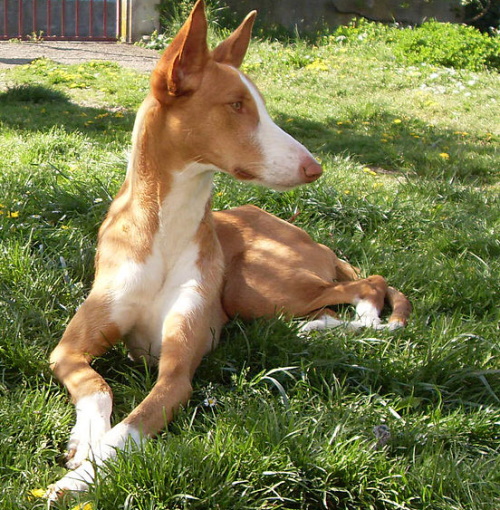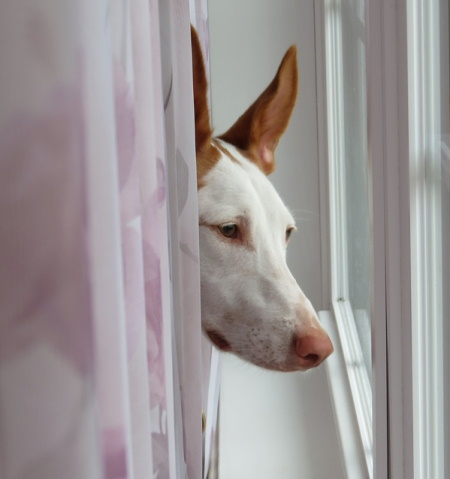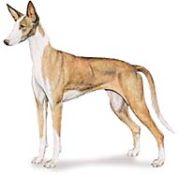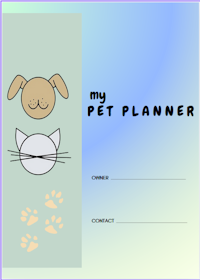Ibizan Hound
Elegant And Playful Dog Breed
The origins of Ibizan Hound dogs are to be found in ancient Egypt where they are believed to have hunted with the pharaohs. Evidence of this fact lies in depictions of similar looking hounds that have been discovered in tombs around circa 3000 BC.
 Courtesy Lydie
Courtesy LydieEven more interesting, when the tomb of King Tutankhamen was opened, a full size statue of a dog
bearing a strong resemblance to the Ibizan was found.
At some point in its early history, the Ibizan dog is said to have accompanied Phoenician traders to the island
of Ibizan, from which its name is derived.
Bred primarily to hunt small game, Ibizans, classified as sighthounds, have the skills to get the job
done, using their keen abilities of sight, sound and scent.
This hound breed was original known as the Podenco Ibicenco and is
recognizable by its tallness, prominent set of erect ears and a
deer-like expression. These features, in addition to their streamlined
physique, can be compared to those of the
Greyhound
and/or the Saluki.
Characteristics of the Ibizan Hound
Ibizan Hound dogs are intelligent, loyal and affectionate. They like to learn and to please their owners, so training them is relatively easy.
However, they are known to be very sensitive, so a gentle and consistent method is the best approach
with lots of positive rewards. Toys and game playing are very popular pastimes with this breed.

Ibizans tend be easily startled by unexpected activity and overly
reserved around strangers. They need a well-rounded socialization with
people, places and things, starting at an early age, to help overcome
these traits.
If the weather is chilly, this breed, having a very lean body mass, can feel the cold and will be grateful for the benefit of
a coat. A warm place to
sleep is also preferred, for the same reason.
Physical Stats And Care
Height: 22-29 inches
Weight: 42-55 lbs.
Color variations: White, chestnut, tawny or any combination of the these
colors.

There are two different coat types, either long and rough or smooth and short.
In both cases, the coat is close and dense. Ibizan Hounds are clean dogs and grooming is easily handled by brushing or rubbing down, depending on the coat type, about once a week.
Shedding is less for the smooth coat and about average for the rough coat.

How Active is the Ibizan?
These dogs need a significant amount of daily exercise such as long walks or jogs. Dog parks (providing they are fenced) can
be a great venue for off-leash running and socializing.
If you have property where they can run, be sure it has a secure high
fence. They have a reputation as fence jumpers and a strong instinct to chase anything that moves.
Another alternative is to involve the Ibizan in lure coursing, this is
an excellent activity for their high energy and natural hunting
abilities.
When exercise time is limited or weather is harsh, the use of a dog treadmill can be a handy substitute.

Dog Fitness Treadmill
Ideal Living Space?
Daily exercise which addresses both mental and physical needs is a higher priority than space.
That being said, a home with access to a
securely fenced outside area would be the most ideal situation. Inside the home, sufficient space to move around freely and a peaceful corner for his bed.
Families With Children?
The Ibizan hound is affectionate and gets along well with children. Being a very playful sort, he will love being
included in any games youngsters care to play.
As with any breed of dog, we recommend that owners always have an adult present when pets and children are interacting.
Senior or Less Active Families?
This breed's loyalty and even temperament makes them good companions for any family including seniors or sedentary environments.
BUT, in all fairness, providing for the Ibizan's exercise needs must be the main consideration.
For those interested in supporting this breed or a obtaining a rescue, contact:
Ibizan Hound Club of the United States
Further Reading

Ibizan Hound - A Complete and Reliable Handbook
Current resource on Ibizan Hound dog breed information, history, characteristics and attributes, grooming, puppy care, house training, nutrition, basic training, health care and disorders that may concern the breed. Many color photos.
Lydie Image: commons.wikimedia.org/wiki/File:Femelle_Podenco_Ibicenco.jpg <br>creativecommons.org/licenses/by-sa/3.0 CC BY-SA 3.0

